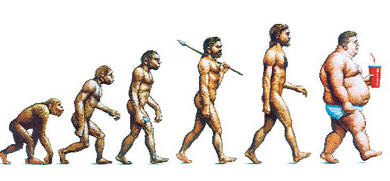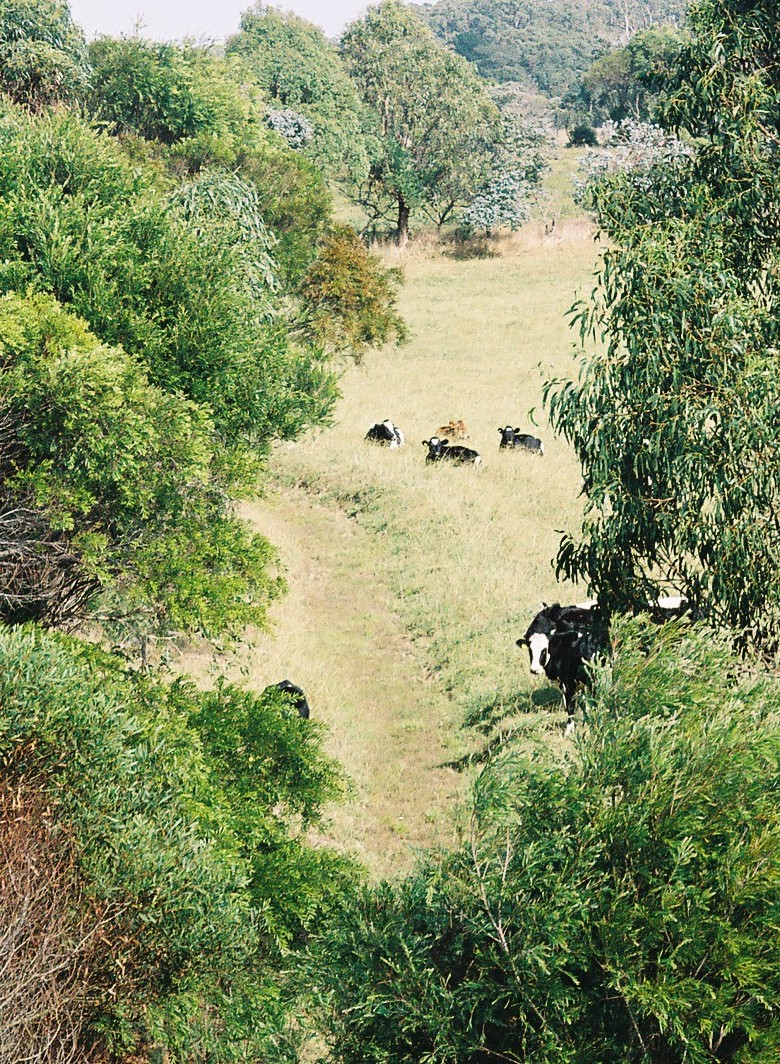I'm starting to think that maybe this is all we need as a Theory Of Everything; it might well prove to be the driving force behind all the known mechanisms of gravity, thermodynamics, quantum attraction, and all that other heady stuff. Entropy is really just a logical corollary. This putative TOE certainly seems to explain a whole lot about how we live our lives as a species on this planet - and I'd humbly suggest it might be time to start wising up to it and working with the way the universe runs.
Sorry, I should back up a step and make my founding point clear: Order tends to spontaneously emerge from chaos, but chaos likewise inevitably follows out of order. Things always eventually fall apart, and things also naturally congregate. This is the sort of stuff that gives us glimpses into the sacred and numinous side of mathematics, but also some of our most prosaic moments of simple beauty. Here's one I prepared earlier:
Pleasing pattern to my eye at least, the way the logs just find their place in what appears to be a repeating pattern, you can quite easily see the averages in log and gap size.
But if you were to look more closely at just a section of the picture...
You only really now see the chaos, just random placings and gaps.
At some level, all of this stuff really is just a matter of scale and perspective. Look at one of Spencer Tunick's installation photos of massed nude humans and you see just pattern, repetitions of basic humanity - but zoom in and you can detect all the wondrous human variance of each person's face, or buttocks, or whatever.
Pleasant weather in Melbourne that day. Which was nice.
Alright, we recognize it visually, and maths nerds have epiphanic conniptions over the ultimate incalculability of pi versus the sheer complete oneness of every single circle, but how does this thing shape the way we are living each day? Can it inform us more deeply about our history?
Profoundly so, and yes.
Much as we like to take credit for shaping our own destinies, over time patterns emerge in our shared history. Empires start, expand, plateau, and fall, giving rise to periods of smaller-scale and usually shorter-term governances, and typically one of these smaller groups grows, expands......and so on. This seems to happen regardless of how we direct our efforts to prevent declines or achieve stability.
Of late we have looked to natural systems to provide us with some answers to these conundra. Something like free market capitalism is a good theoretical example, wherein there is no regulation, so competitors are able to predate, or be preyed upon, to fill and even create niches within the market, to prosper, to die. Just like nature, it would give us booms and busts but over the long term be as stable as anything else. Funny thing is, that even though no such thing as a free market system (unregulated and a level playing field) exists in our world, the natural cycle of order and chaos intrudes and subverts whatever efforts we apply to control the situation. Same goes for planned economies, like socialist states of old (and even now). Chaos and entropy inevitably arise, it has never been otherwise.
Why do we even bother to fight it? Perhaps it's because we do not like to admit our small place in the scheme of things.
Image of Earth from the Mars Surveyor. On Mars.
There's this odd thing going on in so-called conservative movements in the USA right now, calling for those banks and businesses that had massive blowouts in the "GFC" to be allowed to fail, regardless of jobs lost or damage to economies and so forth. It's usually the same voices you hear railing against the health care reforms POTUS Obama has finally got passed. These forces have indeed had many wins in diluting the regulatory and socialisation efforts in those two areas. They are seen by many in the left as radical neo-conservatives (the definiton of 'conservative' politically is one who wishes change to happen only slowly, interestingly) and the image is strongly allied to the 'religious right' and Republican Bible-belt-ism.
Looked at from a natural systems point of view, these (allegedly mainly Creationist) folks are espousing a regime of survival of the fittest. Who'd'a thunk that 'fundamentalist' creationist Christians would be the biggest advocates for us being allowed to ehave as per Darwin's observations of nature? Businesses that do not successfully compete in the market should be eaten or replaced by those that do, and those individuals who do not compete successfully enough in the market to be able to afford good health care should be assisted in being removed from the gene pool by being denied access to such.
Fair call, from that perspective. We'd certainly learn a strong lesson or two by letting a system such as this run its course unfettered.
Then again, we are part of nature, and part of our nature is to fiddle wth stuff. This helps propagate the order/chaos cycle too. Nothing we can do will ever, ever stop it, short of the final entropic collapse of the universe. If that ever happens. Bet it doesn't.
Our more direct relationships with our environment are where we see some of the deeper truths of our ignorance, and also our wisdom. Pollution. The whole carbon/climate change debate. And on the other hand, a new appreciation of the importance of biodiversity, and understandings of how we might just start to fit our lives back into a more natural cycle. I'm thinking here of notions like Permaculture, and effective grass-roots environmental advocacy. Just yesterday people-power prevailed with sensible participatory social actions to help the NSW Premier reverse her previous position and now protect many thousands of hectares of River Red Gums from logging along the Murray-Darling basin, which would have been an incredible disaster had it happened.
Farm near Orana, Vic, Australia.
Permaculture is perhaps one of the best widely-known examples of something we do that embraces the natural cycles of order and chaos. It is far more than a way of gardening, but to be simplistic here the fundamental design principles used are those which best mimic nature, and provide the greatest sustainable productivity from the least amount of energy input, in a designed ecology which is ultimately helped to move towards a state of natural equilibrium - to the extent that such a state can exist.
Chaos is not just allowed, but expected. Half the secret to successful permaculture practice is diversity in every sense. Order just naturally emerges, as you discover certain things like growing in certain places, for example. Aphids attack, ladybirds and other predators move in. Where imbalances occur, ature tends to do something to heal this; but just as importantly, as order arises, so random and chaotic events occur to refresh the system.
In many ways Permaculture is at the heart of a painful struggle going on in the hearst and minds of those who live their love of the planet. Because Permaculture embodies the fact that ecosystems change, that we are a part of nature and have every place in changing and interacting with it (wisely) and that the old ways of environmentalism - saving 'pristine' wilderness as is at any cost - will not succeed in any case in the changed global reality we face. We need to accept the loss of some of the habitats, and lots of the species, we have come to know. We shall see much death and destruction. We shall see much new creation of life and ecology. This is the grand cycle of life, it would seem. The very universe is observed to operate this way, so why would life on Earth be any different? Mass extinctions have happened here since life arose, so perhaps we need to take a step back and humbly accept that despite our love for our planet as it is, things will change.
To do otherwise is just going to hurt more. There are, in fringe suburbs of the city near which I live, 'rogue ecologist gardeners' who go about poisoning certain plants in people's gardens, because they have been deemed by these groups to be damaging weeds to the nearby bushland. Bushland already full of weeds, prone to savage fire since the introduction of cats and dogs and foxes and rabbits (all of which have destroyed or displaced the native animals that used to do such a super job of keeping the forest floor so much cleaner), beset by deadly phytophthora fungus and generally in poor shape - compared to how it was a century and a half ago. It's too late, people. Time to let nature (which includes us acting wisely, with natural systems and ways, and not necessarily endemic-only planting programs to try and recapture a lost time) do some healing.
This will all work out.
It always has.
You are allowed to just bear witness, you know; destruction and chaos give us creation and order.
In case you don't think you live in a universe of circles, go outside and look up.
.








No comments:
Post a Comment